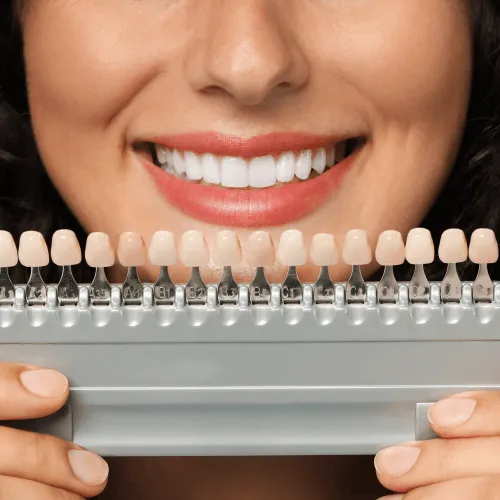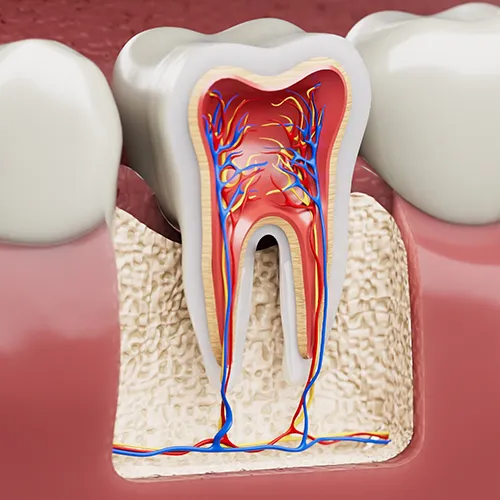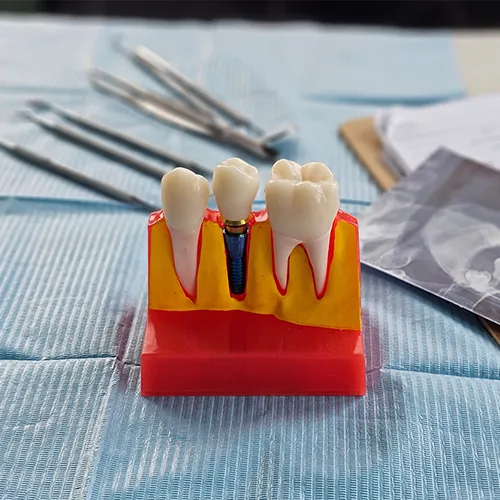Restorative Dentistry
Implants vs. Bridge: Which One Feels More Like You?
Losing a tooth as an adult is more common than you might think. Whether it’s from decay, an accident, or gum disease, the gap left behind is more than a cosmetic concern, it can impact your ability to chew, speak, and even affect the health of surrounding teeth. That’s why replacing missing teeth isn’t just about filling a space. It’s about restoring confidence, function, and your overall oral health.
At Akemi Dental Specialists, we often hear one big question from patients looking to replace a missing tooth: “Should I get a dental implant or a bridge?” And while both are solid options, they’re built for different situations, and different people.
So how do you choose the right one? Let’s break it down in a way that makes sense, even if you haven’t stepped foot in a dentist’s office for a while.
What is the main difference between a bridge and a dental implant?
To put it simply, a bridge fills the gap by using the neighboring teeth for support. A dental implant replaces the tooth and its root by anchoring a post into your jawbone.
Here’s how each works:
- Dental Bridge: A bridge relies on the teeth on either side of the gap to hold a false tooth (or teeth) in place. Those supporting teeth, called abutments, are usually filed down so crowns can be placed on top, anchoring the prosthetic in the middle.
- Dental Implant: An implant is a small titanium post surgically placed into your jawbone. Over time, it fuses with the bone, acting like a natural root. A crown is then placed on top, giving you a tooth that looks and functions just like the real thing.
So at a glance, bridges are quicker, less invasive, and often less expensive upfront. Implants take more time and planning, but they’re a longer-term solution that doesn't affect neighboring teeth.
But the difference isn’t just clinical, it’s also personal. Let’s dig deeper.
Which option lasts longer: implant or bridge?
When you're investing in your smile, durability matters. And this is where implants tend to shine.
- Dental Bridges typically last anywhere from 5 to 15 years, depending on how well you care for them. Over time, the supporting teeth may become vulnerable to decay or fracture, especially since they’ve been altered to hold the bridge.
- Dental Implants, on the other hand, can last 20 years or more, sometimes even a lifetime. Because they fuse directly with the bone, they become a part of your anatomy, making them incredibly stable and durable. The crown on top may eventually need to be replaced, but the implant itself is designed to last.
Of course, success with either option depends on good oral hygiene and regular dental visits. But when you’re thinking long-term, implants tend to offer more peace of mind.
Are implants always better than bridges?
Not necessarily. The best option depends on several personal factors:
Implants may be better for you if:
- You want a solution that closely mimics a natural tooth, root and all.
- You’re looking for something that won’t impact your other teeth.
- You’re okay with a longer process and possibly higher initial cost.
- You have healthy gums and enough bone to support the implant.
Bridges may be better if:
- You want a quicker solution with fewer visits.
- Your jawbone isn’t strong enough for implants and you’re not ready for bone grafting.
- You want to avoid surgery.
- The teeth on either side of the gap already have large fillings or crowns, making them suitable to anchor the bridge.
In some cases, your dentist might even recommend combining both options, like an implant-supported bridge if you’re missing several teeth in a row.
Is getting a dental implant painful or complicated?
We get this one a lot, and it’s understandable, anything involving surgery can sound intimidating. The truth is, implant placement is a very predictable and controlled procedure, especially in experienced hands like ours.
Here’s what the typical process looks like:
- Consultation & Imaging: We assess your jawbone, take X-rays or a CT scan, and develop a personalized plan.
- Placement: The titanium post is placed under local anesthesia. Most patients report that it’s less uncomfortable than having a tooth pulled.
- Healing: This phase, called osseointegration, takes a few months. The implant fuses with your bone to create a stable base.
- Crown Placement: Once healed, we attach a natural-looking crown that matches your other teeth in shape and color.
Most people are surprised at how easy the recovery is, many return to work the next day. Mild soreness is common but manageable with over-the-counter painkillers.
With a bridge, the process is faster and usually complete in just 2-3 visits. No surgery, no healing time. That’s a big plus for some patients.
So which one feels more natural?
This one’s easy: implants win here.
Because they replace the tooth root and integrate with the jawbone, implants feel and function more like real teeth. There’s no clicking, shifting, or worrying about eating certain foods. Most patients forget which tooth is the implant.
Bridges are also very comfortable and natural-looking, but they can sometimes trap food underneath and may feel slightly different over time as the gum tissue changes.
If you're looking for something that feels like it’s always been a part of you, an implant is probably your best bet.
What happens if I don’t replace a missing tooth?
Here’s the thing: leaving a gap might seem harmless, especially if it’s in the back where no one sees it. But it can create a domino effect:
- The neighboring teeth can shift or tilt into the gap.
- Your bite can become misaligned, leading to jaw pain or uneven wear.
- Bone loss can occur in the area of the missing tooth, making future restorations more complex.
- It can affect your speech and the way you chew.
Replacing a missing tooth isn’t just about looks; it’s about function and preventing future complications.
Let’s talk about you
There’s no one-size-fits-all answer when it comes to restoring your smile. What works for your friend or neighbor might not be the right choice for you, and that’s okay.
At Akemi Dental Specialists, we take the time to understand your goals, your oral health, and what’s realistic for your lifestyle. Whether you lean toward a bridge, an implant, or just want to explore your options, we’re here to walk you through it with no pressure.
Schedule your consultation today, and let’s talk about the next steps together.























